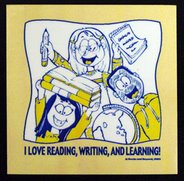Making the Most of You and ICU
NP Lecture with Ken Enochs, April 23rd and 24th
I. Why college?
A. Specifically, why have you chosen ICU?
B. Complete the following: “As an adult, I want others to think I am . . .”
| ___educated 教養がある | ___efficient 効率的 | ___punctual 時間を守る |
| ___hardworking 勤勉 | ___productive生産的 | ___creative 創造的 |
| ___articulate 雄弁な | ___respected 尊敬される | ___reliable 頼れる |
| ___honest 正直 | ___interesting 興味深い | ___conscientious真面目 |
| ___well-liked 人に好か れる | ___understanding人の 気持ちがわかる | ___trustworthy 信頼で きる |
Which of these qualities do you feel you possess now? Circle them.
II. Having the right attitude
A. How often do you find yourself saying the following? What should you say? Instead say
“I can’t do it.” __________________
___ Never ___ Sometimes ___ Often
“I don’t have the time.” __________________
___ Never ___ Sometimes ___ Often
“l’ll do it later.” __________________
___ Never ___ Sometimes ___ Often
“I got in, and that’s enough.” __________________
___ Never ___ Sometimes ___ Often
B. According to John Langan, author of Ten Skills You Really Need to Succeed in College, what attitude is essential for college success?
C. What does Laurence Gonzales, author of Deep Survival, say is an essential attitude in serious survival situations?
III. What is a college “education”?
A. What was the Ken’s friend told when he went off to college?
“Don’t let your __________ get in the way of your college _____________.”
(interfere with)
How would you translate the above into Japanese?
B. What does Richard Light, author of Making the Most of College, say about non-study activity?
IV. Practical advice for making the most of college
1. Get ____________
(Especially through the _____)
2. Work ______________
3. ___________________ your time
a. Use your _____________
b. Keep a monthly calendar
c. Have a _________ ____________
d. Have a daily “to do” list
4. ___________ with your professors
5. Study ____________
6. Take classes that require ________________
V. In conclusion . . .
-
College is when you develop the to be a successful adult.
-
You need the right
-
A college “ ” means more than just .
-
The above practical advice will ensure a college experience.
